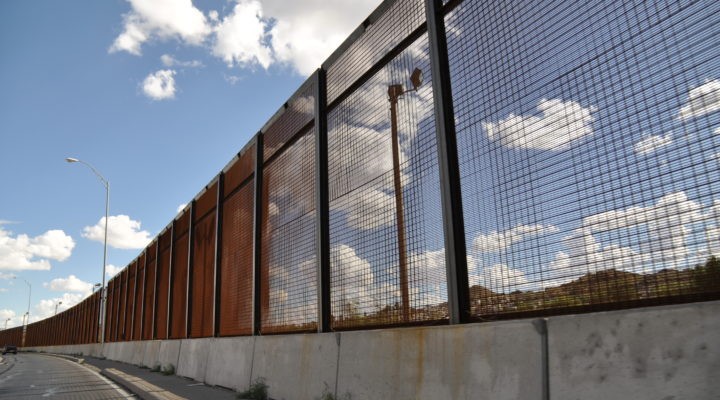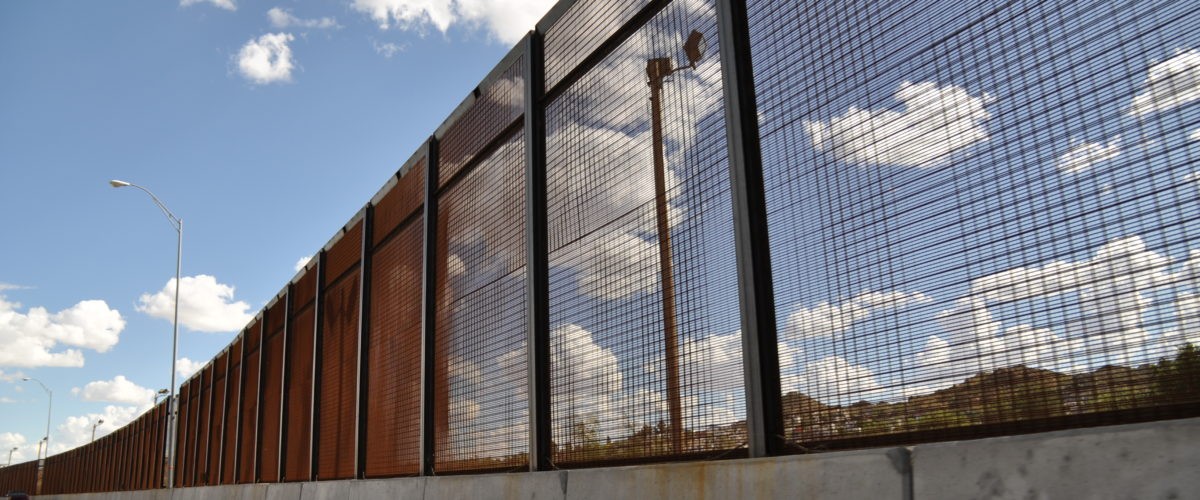Religious leaders gathered at a vigil in December to declare support for Rosa Gutierrez Lopez, an El Salvadoran immigrant who had just taken sanctuary in a Maryland church to avoid deportation.
Baptist minister and immigrant rights activist Julio Hernandez was one of the speakers at Cedar Lane Unitarian Universalist Church in Bethesda, where Lopez continues to find refuge.
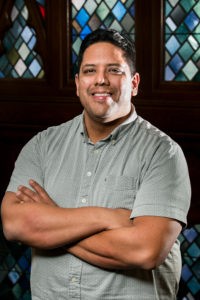
Julio Hernandez (Photo by Tania Fernandez)
Before reading Psalm 34:18 to the interfaith audience, Hernandez shared that he felt unworthy praying for Lopez.
“It should be the other way around. Rosa should be praying for us,” Hernandez says in a video of the Dec. 12 event posted on YouTube.
“There’s thousands of Rosas. Thousands of Joses at the border. Thousands of little children suffering,” said Hernandez, an American Baptist minister and family and children minister at a United Methodist congregation in Falls Church, Virginia.
Hernandez knows the truth of this not only from news reports and vigils but also from his work with immigrants living, working and suffering in America’s shadows.
And he knows it from his and his wife’s family history, which have provided the insight and inspiration for his ministry, Hernandez told Baptist News Global.
Hernandez was born in the U.S. to El Salvadoran immigrants. His wife’s father is a Syrian-born Baptist pastor.
Those relatives, just like the immigrants he seeks to serve, always end up blessing him.
“If you spend time with these people, it just blows you away, their faith,” said Hernandez, 42. “They are why I remain Christian.”
‘Congratulations, you are being deported’
Hernandez’ late mother, Dina, modeled faith in action for him.
Her reason for coming to the United States – on a tourist visa – was an act of loving service: to help her sister, a single mom.
Eventually she reconnected with Julio Hernandez, a church friend from El Salvador.
“They fell in love and got married here,” Hernandez said.
She reported the marriage to the then-Immigration and Naturalization Service officials during a regular visit.
“And they said congratulations, you are being deported in two weeks.”
The couple had moved to Falls Church to launch an Hispanic ministry at Columbia Baptist Church. The husband of a Bible study member helped get the deportation rescinded and she and Julio eventually became American citizens.
During and after that challenge, Hernandez said, his mother’s faith drove her to focus on helping others.
“Mom wasn’t ordained,” he said. “She didn’t have a mission agency backing her.”
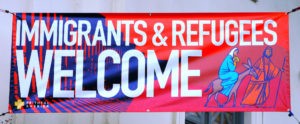
(Photo/Rick Obst/Creative Commons)
What she had was an intrinsic calling to bring whatever comfort she could those on the margins, he said.
One of her roles was as a community liaison for local schools, where she helped students and families in need to obtain food, clothing and other necessities, he said.
She also supported causes and ministries outside the U.S.
“This little woman of less than 5 feet impacted the world. It was amazing to see.”
When she was hospitalized and dying of pancreatic cancer, it was Dina Hernandez who comforted those who had come to comfort her.
“So many times, they would come in crying and leave smiling,” he said.
Dina demonstrated how to have a strong faith in the midst of suffering, Hernandez said.
“My mom had this deep joy in her life. She had a deep prayer life and a deep connection with the Bible.”
Hernandez said his own walk of faith and ministry is an attempt to follow his mother’s example.
“Today, my mom would probably be deported,” he said. “So, through the work I do, I try my best to repay those church people who helped my mom stay in America and give our family a wonderful life.”
‘More time with people who act like Jesus’
And he’s doing that much in the same way his mother did: by cooperating with others motivated by faith.
Hernandez is a board member of the Virginia Interfaith Center for Public Policy and collaborates with organizations like Sanctuary DMV, which seeks to support immigrants and marginalized communities in the Washington D.C., Maryland and Virginia.
“I’m doing what I can to find community allies” seeking to meet the many desperate needs of immigrants, Hernandez said.
Sometimes those allies are churches, he said. And sometimes they aren’t. It’s why Hernandez said he leans heavily on ecumenical and interfaith connections.
“I have learned to spend less time with people who talk about Jesus and spend more time with people who act like Jesus.”
Hernandez said he also finds allies in an informal network dedicated to helping newly arrived immigrants legally in the country with pending asylum cases. Usually they are merely dropped off at bus stations by authorities after gaining entrance.
“These immigrants have nothing other than what they have when they came into the country.”
Volunteers help connect those immigrants with needed food, clothing, medical care and rides to find families or friends, sometimes in other cities and states.
Again, Hernandez stressed that it is he who is being blessed.
“The more time you spend with Jesus the more you see God’s heart for the poor and the powerless,” he said. “I think God shows up in special ways.”
‘Filled with gratitude’
That spiritual axiom also has been reinforced through Hernandez’ relationship with his wife, Lisa, and her family.
The couple met at a retreat when he worked for Young Life right out of college. He was an activities manager. She was a volunteer. Both grew up in the same area and both were Baptist.
“She attended Arabic Baptist Church in Washington D.C.,” he said.
That church had been founded by her father, Pastor Esper Ajaj, who was raised an Orthodox Christian in Syria. Hearing the message of an Egyptian evangelist led him eventually to Protestantism.
“My wife will tell people ‘my dad is from a Syria, and a Baptist minister.’ People will say ‘I didn’t know they let imams be pastors,’” he said. “People don’t realize there are Christians in the Middle East.”
Ajaj once returned to Syria and was arrested by authorities suspicious of clergy because a Western spy had entered the country disguised as a priest, Hernandez said. Ajaj had no complaints about his incarceration and interrogation, however.
“He loved it because he got to share the gospel” with the guards and other prisoners, Hernandez said. “He came out kind of happy but he is not allowed to return to Syria.”
The example is a powerful one, said Hernandez, who was ordained by Ajaj at Arabic Baptist Church.
One of his wife’s cousins, an attorney and civil rights leader, has run afoul of Syrian authorities for representing ethnic minorities.
Another cousin, an actor, was also detained.
“We support Amnesty International because they were key in getting him released,” Hernandez said.
And there is the worldview Hernandez and his wife share from having parents who are immigrants. It’s enabled both to see the world as imperfect, sometimes brutally so, and instills in them a connection with refugees, immigrants and others who suffer, he said.
“My country was ravaged by civil war during my childhood, and my wife’s country is ravaged by civil war now.”
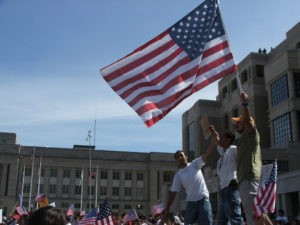
Activists rally for immigration reform. (Photo/Britt Selvitelle/Creative Commons)
Through those connections, Hernandez said he witnesses the social and political forces that have led people like his parents, his father-in-law and Rosa Gutierrez Lopez to seek refuge in the United States.
“American imperialism doesn’t have a political party,” Hernandez said, noting that deportations also were rampant during the Obama administration.
“Our immigration policy is reflective of how we treat the world,” he said. “A lot of people who came to America are victims fleeing the wars” in which the U.S. had some influence.
Yet they arrive in the U.S. with an enduring faith and often are an encouragement to others.
“I meet a lot of hardworking people, people on the margins who survive on very little and who are filled with a lot of gratitude,” he said.

